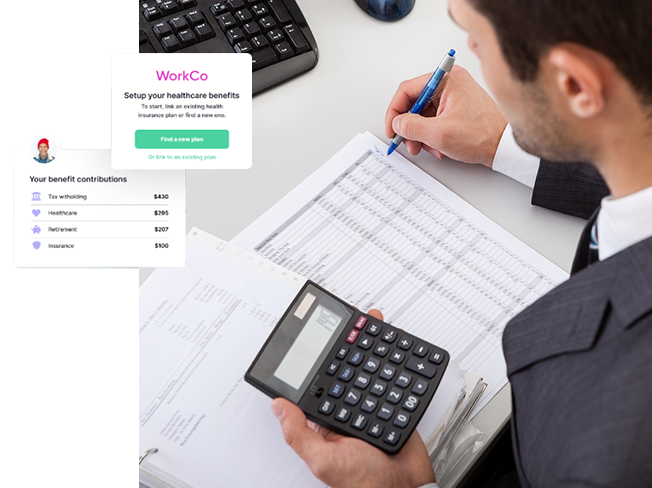
Income tax is an inevitable part of life for most residents and businesses in the United States. In the heart of the nation, New York State is a prime example of this fiscal reality, boasting one of the country’s most complex and dynamic tax landscapes.
Whether you’re an individual navigating the intricate world of personal income tax or a business owner looking to understand the implications for Limited Liability Companies (LLCs) and partnerships, the Empire State’s tax system can be a daunting labyrinth to traverse.
In this comprehensive guide, we’ll embark on a journey to demystify New York State income tax for individuals, LLCs, and partnerships. From the bustling streets of New York City to the serene landscapes of upstate New York, we’ll explore the nuances of tax regulations that impact the financial well-being of millions.
By the time you’ve completed this journey, you’ll have a clearer understanding of your tax obligations and be armed with essential knowledge to make informed financial decisions and optimize your tax position.
Complexities of New York State Income Tax
New York State’s income tax system is known for its complexities, which often stem from its commitment to providing its residents with a wide range of services and infrastructure. As a result, the tax code has evolved to accommodate these demands, leading to various tax brackets, deductions, and credits.
One of the unique features of New York’s income tax is the progressive tax structure. This means that the tax rate increases as your income rises.
Another complex aspect is the plethora of deductions and credits available to New York residents. These can include deductions for mortgage interest, real property taxes, college savings contributions, and retirement income exclusion. Tax credits, like the Child and Dependent Care Credit or the Empire State Child Credit, can further reduce your tax liability. Understanding which deductions and credits apply to your specific situation is essential for optimizing your financial position.
In the case of businesses, choosing the right tax classification for LLCs and partnerships can be complex. Making the wrong choice may result in unintended tax consequences. Thus, it’s crucial to consult with tax professionals to ensure that your business entity is taxed in the most advantageous way.
Worried About Tax Season?
Say goodbye to stress and let us manage your
numbers with meticulous care.
New York State: Income Tax for Individuals, LLCs, and Partnerships
New York State’s income tax system for individuals is a key revenue generator for the state. Understanding how it works is crucial to ensure compliance and minimize your tax liability. New York State employs a progressive income tax structure, which means that tax rates increase as your income rises.
The state also offers various deductions and tax credits, such as the Earned Income Tax Credit (EITC), to help reduce your tax burden. Understanding which deductions and credits apply to your situation can lead to substantial tax savings.
Being aware of your filing status is essential, as this impacts your tax liability. New York State recognizes several filing statuses, including single, married, head of household, and more. Choosing the right status is crucial for accurate tax calculations.
Income Tax for LLCs in New York
Understanding the tax implications is vital if you’re a business owner operating as an LLC in New York. LLCs are generally considered pass-through entities, which means that business income is passed through to the owners and reported on their individual tax returns.
In New York State, LLCs can elect to be treated as either a partnership or a corporation for tax purposes. Choosing the right tax classification depends on the specific needs and goals of your business. Electing corporate status may have different tax implications compared to partnership status.
Income Tax for Partnerships in New York
Partnerships in New York follow a similar pass-through taxation model as LLCs. The income earned by the partnership is allocated to the individual partners, who report it on their individual tax returns.
As a partner, you’ll receive a Schedule K-1 from the partnership, which outlines your share of the partnership’s income, deductions, and credits. This information is essential for accurately reporting your income to the state.
Differences Between Individual, LLC, and Partnership Income Tax
| Aspect | Individual Income Tax | LLC Income Tax | Partnership Income Tax |
|---|---|---|---|
| Tax Classification | Typically, a Sole Proprietorship, Single Member LLC, or Partnership (for multi-member LLCs) | Elects partnership or corporation status (Default is pass-through taxation) | Pass-through taxation (income is passed to individual partners) |
| Tax Rates and Brackets | Progressive tax rates range from 4% to 8.82% | Subject to personal income tax rates | Subject to personal income tax rates |
| Filing Status | Individual filing status, e.g., single, married, head of household | Depending on election: Partnership – Form 1065 or LLC – Form 1065 or 1120 | Partners file as individuals using Form IT-204 |
| Reporting Income | Report personal income on Form IT-201 | Pass-through income reported on individual returns | Share of partnership income reported on individual returns |
| Deductions and Credits | Eligible for individual deductions and credits (e.g., mortgage interest, education credits) | Business deductions and credits available for LLC expenses | Partnership deductions and credits apply to partners’ individual tax returns |
| Self-Employment Tax | Subject to self-employment tax on earned income | Self-employment tax on net earnings for self-employed LLC members | No self-employment tax on partnership income |
| Taxation of Business Income | Personal income tax applies to business income | Business income is passed through to individual members and taxed at personal rates | Pass-through taxation, with each partner paying tax on their share of income |
| Limited Liability | Personal assets may be at risk, limited protection | Limited liability protection for members | Limited liability protection for partners |
| Choice of Tax Classification | Limited flexibility, generally categorized based on business structure | LLCs can elect corporate taxation or remain as pass-through entities | Can elect S-corporation status for some tax advantages |
| Audit and Tax Disputes | Individual audits and disputes | Potential for business audits and disputes | Partnership audits and individual partner disputes |
| Ownership and Management | Sole proprietorship or co-ownership by multiple individuals | Multi-member LLCs have designated managers or managing members | Managed collectively by the partners |
| Record Keeping | Maintain personal financial records | Maintain business financial records | Partners maintain records of their share of income and expenses |
| Dissolution and Ownership Changes | Typically, simpler for individuals | More complex for LLCs with multiple members | Partnership agreements govern dissolution and ownership changes |
| Losses and Profit Sharing | Personal responsibility for losses and profits | Profits and losses are distributed to LLC members based on ownership share | Profits and losses are shared according to a partnership agreement |
| Tax Planning Opportunities | Limited flexibility for tax planning | More options for strategic tax planning in New York | Flexible allocation of income and losses |
| Year-End Tax Documents | Receive Form W-2 or 1099-MISC for income reporting | Receive Schedule K-1 for LLC income | Receive Schedule K-1 for partnership income |
Tailored Solutions to
Your Business
Needs
We believe that each business is unique, which is
why we tailor our bookkeeping services to meet your
specific needs. From companies to established businesses,
we have your back!
Contact-Us
Recent Tax Law Changes and Updates
Tax laws are subject to change, and it’s crucial to stay informed about the latest updates. Recent changes can affect your tax liability and financial planning. New York State has made various changes to its tax laws over the years, including adjustments to tax rates, deductions, and credits. To ensure compliance and maximize your savings, consult the most up-to-date tax information from official sources.
Tax Tips and Strategies
It’s time to explore some essential tips and strategies for minimizing your tax liability and ensuring compliance.
- Maximize Deductions and Credits: New York offers a range of deductions and credits that can significantly reduce your tax bill. These may include deductions for contributions to a 529 college savings plan, itemized deductions for mortgage interest and property taxes, and credits such as the Child and Dependent Care Credit. Be sure to explore all possible deductions and credits that apply to your situation and take full advantage of them.
- Record-Keeping: Accurate record-keeping is critical when it comes to filing your New York State income tax return. Maintain organized records of income, expenses, deductions, and credits. This not only ensures compliance but also simplifies the filing process and helps you claim all eligible deductions.
- Stay Informed: As mentioned earlier, New York State tax laws can change, impacting tax rates, deductions, and credits. Staying informed about these changes is vital to maintaining financial control. The New York State Department of Taxation and Finance provides updated information on their website, and consulting with a tax professional can also help you navigate these changes.
- Plan for the Future: Effective tax planning involves more than just preparing for the current tax year. It’s about strategizing for the long term. Consider how your financial decisions today will affect your tax situation in the future. This could include retirement planning, investment strategies, and estate planning.
- Seek Professional Guidance: Tax laws are intricate, and the stakes can be high. Many individuals and business owners find it beneficial to seek professional guidance from a certified public accountant (CPA) or tax attorney. These experts can provide personalized advice, help with tax planning, ensure compliance, and potentially uncover opportunities for tax savings.
Lighten Your Load with
Affordable BookKeeping
Packages
We offer competitive packages that won’t break the bank,
and up-front pricing so you know exactly what you’re getting
as your return on investment.

The Benefits of Hiring a Professional Accountant
While some individuals and businesses attempt to navigate the complex world of New York State income tax on their own, many find that professional assistance offers several advantages:
- Expertise: Professional accountants are well-versed in tax laws and regulations. They stay up to date with the latest changes, ensuring that you’re always in compliance with current tax requirements. This expertise can help you avoid costly mistakes and audits.
- Tax Planning: Accountants can create customized tax strategies to minimize your tax liability. They understand the deductions and credits available to you and can help you structure your finances to maximize your tax savings.
- Time Savings: Tax preparation can be time-consuming, especially for businesses with complex financial structures. Hiring a professional accountant frees up your time, allowing you to focus on your core activities, whether it’s running your business or enjoying your personal life.
- Reduced Stress: Dealing with taxes can be stressful, particularly when you’re unsure about the intricacies of the tax code. Having a professional accountant by your side can reduce this stress, knowing that your finances are in capable hands.
- Audits and Disputes: In the unfortunate event of an audit or tax dispute, having a professional accountant is invaluable. They can represent you, ensure that you have the necessary documentation, and advocate on your behalf to reach a resolution.
- Long-Term Financial Planning: Accountants do more than just prepare your taxes; they can help with your overall financial planning. They can advise on retirement savings, investment strategies, and other aspects of your financial future.
- Customized Advice: Your financial situation is unique, and a professional accountant can provide personalized advice that takes your specific circumstances into account. This tailored guidance can lead to better financial decisions.
- Tailored Guidance for Business Owners: If you’re a business owner in New York, whether you have an LLC or partnership, navigating the state’s tax requirements can be especially challenging. Professional accountants are well-versed in the complexities and intricacies of business taxation, including payroll taxes, sales taxes, and other business-specific tax obligations. They can provide guidance on compliance and help you structure your business to minimize tax liability.
- Safeguard Against Errors: The complexity of the New York State tax code means that errors in tax returns can occur even with the best of intentions. Such errors can lead to penalties and interest charges. Professional accountants have the expertise and attention to detail needed to minimize the risk of errors and ensure accurate tax filings.
- Audit Support: Facing a tax audit can be a stressful experience. If you’re selected for an audit, a professional accountant can serve as your advocate and guide you through the process. They can help gather the necessary documentation, answer the auditor’s questions, and represent your interests, increasing your chances of a favorable outcome.
- Customized Strategies for Individuals: For individual taxpayers, a professional accountant can devise tax strategies tailored to your unique financial circumstances. They can recommend the best filing status, deductions, and credits to take advantage of, ultimately helping you keep more of your hard-earned money.
- Proactive Tax Planning: Professional accountants don’t just prepare your taxes at the end of the year; they can provide year-round tax planning services. By staying engaged with your financial situation throughout the year, they can help you make financial decisions that will have a positive impact on your tax liability.
- Peace of Mind: Perhaps one of the most significant benefits of hiring a professional accountant is the peace of mind it provides. Knowing that a qualified expert oversees your financial matters and ensures compliance with New York State tax laws can relieve stress and allow you to focus on other important aspects of your life or business.
Conclusion
In conclusion, understanding New York State income tax for individuals, LLCs, and partnerships is essential for financial success in the Empire State. You can make informed decisions that optimize your financial well-being by comprehending tax structures, rates, deductions, and credits. Keeping up with tax law changes, employing effective tax planning strategies, and, in many cases, hiring a professional accountant are all crucial steps in managing your tax obligations.
If you are looking to hire a professional accountant for your income tax obligations, then Books and Balances Inc. has the perfect solution for you. We offer tax planning and preparation along with our other services, including bookkeeping, LLC registration, payroll, and CFO services.
Contact us now!



